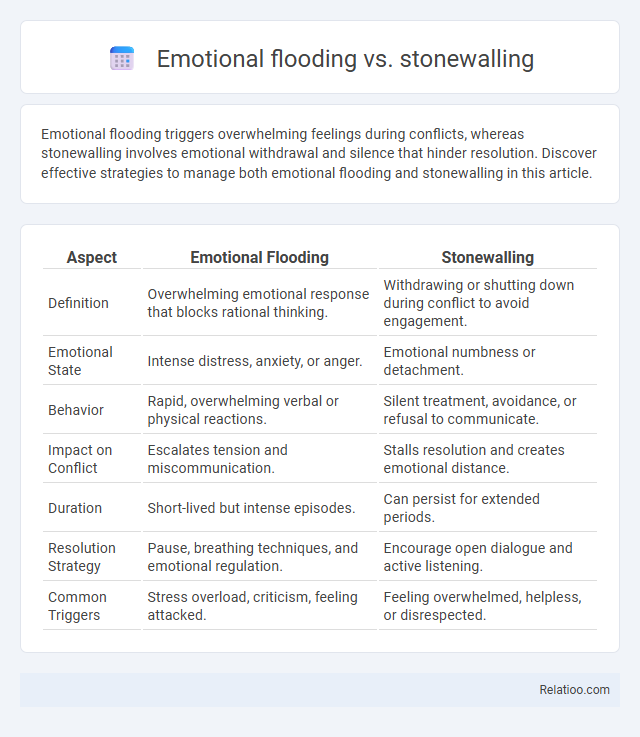Emotional flooding triggers overwhelming feelings during conflicts, whereas stonewalling involves emotional withdrawal and silence that hinder resolution. Discover effective strategies to manage both emotional flooding and stonewalling in this article.
Table of Comparison
| Aspect | Emotional Flooding | Stonewalling |
|---|---|---|
| Definition | Overwhelming emotional response that blocks rational thinking. | Withdrawing or shutting down during conflict to avoid engagement. |
| Emotional State | Intense distress, anxiety, or anger. | Emotional numbness or detachment. |
| Behavior | Rapid, overwhelming verbal or physical reactions. | Silent treatment, avoidance, or refusal to communicate. |
| Impact on Conflict | Escalates tension and miscommunication. | Stalls resolution and creates emotional distance. |
| Duration | Short-lived but intense episodes. | Can persist for extended periods. |
| Resolution Strategy | Pause, breathing techniques, and emotional regulation. | Encourage open dialogue and active listening. |
| Common Triggers | Stress overload, criticism, feeling attacked. | Feeling overwhelmed, helpless, or disrespected. |
Understanding Emotional Flooding and Stonewalling
Emotional flooding occurs when your body is overwhelmed by intense emotions, making it difficult to think clearly or respond calmly during conflicts. Stonewalling, on the other hand, involves shutting down emotionally and withdrawing from interaction to avoid confrontation or distress. Understanding emotional flooding and stonewalling helps you recognize these patterns early, allowing for healthier communication and conflict resolution in relationships.
Key Differences Between Emotional Flooding and Stonewalling
Emotional flooding occurs when overwhelming emotions cause a person to feel out of control, often leading to intense reactions and difficulty processing information, while stonewalling involves shutting down, withdrawing, or refusing to engage in communication during conflict. The key differences lie in emotional expression: emotional flooding is characterized by heightened, intense feelings, whereas stonewalling is marked by emotional shutting down and avoidance. Understanding these distinctions helps in addressing communication breakdowns and improving conflict resolution strategies.
Signs and Symptoms of Emotional Flooding
Emotional flooding is characterized by overwhelming feelings of frustration, anger, or anxiety that cause a person to become physically and mentally overwhelmed, often resulting in rapid heartbeat, sweating, and difficulty thinking clearly. In contrast, stonewalling involves emotional withdrawal, where an individual becomes unresponsive, shuts down communication, and may display blank stares or physical distancing. Signs of emotional flooding include intense emotional arousal, difficulty regulating emotions, and a sense of being out of control, which can escalate conflicts during interpersonal interactions.
Recognizing Stonewalling in Relationships
Recognizing stonewalling in relationships involves identifying when your partner withdraws emotionally, shuts down communication, or refuses to engage during conflicts, creating a barrier to resolution. Unlike emotional flooding, where intense feelings overwhelm you and impair thinking, stonewalling results in emotional detachment and silence that can escalate misunderstandings. Understanding these distinct responses helps you address communication breakdowns and foster healthier interactions.
Causes and Triggers for Emotional Flooding
Emotional flooding occurs when overwhelming feelings, such as anger or anxiety, are triggered by stressful conflicts or perceived threats, often escalating communication breakdowns. Stonewalling, by contrast, is a defensive response characterized by emotional withdrawal to avoid confrontation, which can intensify emotional flooding in your interactions. Identifying the causes and triggers of emotional flooding, like accumulated stress or unresolved tension, helps you manage emotional responses and improve relationship dynamics.
Psychological Reasons Behind Stonewalling
Stonewalling occurs when Your brain perceives overwhelming stress and shuts down communication as a defense mechanism, often triggered by emotional flooding where intense feelings become difficult to process. Psychological reasons behind stonewalling include activated fight-or-flight responses, heightened anxiety, and a diminished ability to regulate emotions, leading to withdrawal instead of engagement. Recognizing these unconscious protective behaviors can help You address the root causes and improve emotional connection in relationships.
Emotional Flooding: Impact on Communication
Emotional flooding occurs when overwhelming emotions, such as anger or anxiety, trigger a physiological response that impairs your ability to process information and communicate effectively. This intense emotional state often leads to shutdowns similar to stonewalling, where one may become unresponsive or defensive, obstructing productive dialogue. Understanding emotional flooding helps you recognize the signs early and adopt strategies like deep breathing or taking breaks to restore calm and improve communication dynamics.
Stonewalling: Effects on Relationship Dynamics
Stonewalling, characterized by emotional withdrawal and refusal to engage, significantly disrupts relationship dynamics by creating a barrier to constructive communication and fostering feelings of isolation and frustration. Unlike emotional flooding, where overwhelming emotions can lead to outbursts, stonewalling stalls resolution and exacerbates conflicts through silence and avoidance. Persistent stonewalling correlates with decreased intimacy and increased risk of relationship dissolution, emphasizing the critical need for partners to recognize and address this pattern.
Strategies to Manage Emotional Flooding
Emotional flooding occurs when intense feelings overwhelm your ability to think clearly, while stonewalling involves withdrawing or shutting down during conflict. Effective strategies to manage emotional flooding include practicing deep breathing techniques, taking a temporary break to cool down, and using mindfulness to stay grounded in the present moment. Implementing these methods can help you regain control and communicate more effectively during emotionally charged situations.
Overcoming Stonewalling for Healthier Connections
Stonewalling, characterized by withdrawal and silence during conflict, significantly damages relationships by blocking communication and emotional connection. Overcoming stonewalling involves recognizing its triggers, practicing self-soothing techniques, and engaging in open, empathetic dialogue to rebuild trust. Addressing stonewalling enhances emotional intimacy and resilience, contrasting with emotional flooding, which involves overwhelming feelings that can escalate conflicts if not managed.

Infographic: Emotional flooding vs Stonewalling
 relatioo.com
relatioo.com